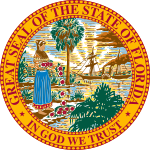| ||||||||||||||||||||||
Both of Florida's seats to the Confederate States House of Representatives | ||||||||||||||||||||||
|---|---|---|---|---|---|---|---|---|---|---|---|---|---|---|---|---|---|---|---|---|---|---|
| ||||||||||||||||||||||
 | ||||||||||||||||||||||
The 1861 Confederate States House of Representatives election in Florida was held on Wednesday, November 6, 1861 to elect the two Confederate States Representatives from the state of Florida, one from each of the state's congressional districts, to represent Florida in the 1st Confederate States Congress. The election coincided with the elections of other offices, including the presidential election and various state and local elections.
The winning candidate would serve a two-year term in the Confederate States House of Representatives from February 18, 1862, to February 17, 1864.
Background
Florida seceded from the Union on January 10, 1861 and joined the Confederate States of America. The state appointed five delegates to the Provisional Confederate Congress, to serve in interim until the Congress first convened on February 18, 1862.
District 1
Candidates
- Antonio A. Canova, state representative
- James M. Commander, former U.S. Army general
- James Baird Dawkins, former U.S. attorney for the U.S. Circuit Court for the Eastern District of Florida
- Philip Dell, former president of the Florida Senate
General election
Results
| Party | Candidate | Votes | % | ±% | |
|---|---|---|---|---|---|
| Independent | James Baird Dawkins | 1,462 | 36.07% | N/A | |
| Independent | Philip Dell | 1,050 | 25.91% | N/A | |
| Independent | Antonio A. Canova | 980 | 24.18% | N/A | |
| Independent | James M. Commander | 561 | 13.84% | N/A | |
| Majority | 412 | 10.17% | N/A | ||
| Turnout | 4,053 | 100% | |||
Aftermath
Dawkins resigned from Congress on December 9, 1862 following his appointment to a state court by Governor John Milton. The special election to replace him was won by John Marshall Martin.
District 2
Candidates
- Frederick R. Cotton, planter
- Robert Benjamin Hilton, former U.S. representative-elect
- James L. Mosely, former North Carolina state representative
- John Tanner, former Orange County commissioner
- Frederick L. Villepigue, secretary of state of Florida
General election
Results
| Party | Candidate | Votes | % | ±% | |
|---|---|---|---|---|---|
| Independent | Robert Benjamin Hilton | 1,668 | 38.68% | N/A | |
| Independent | James L. Mosely | 937 | 21.73% | N/A | |
| Independent | Frederick R. Cotton | 774 | 17.95% | N/A | |
| Independent | John Tanner | 497 | 11.53% | N/A | |
| Independent | Frederick L. Villepigue | 436 | 10.11% | N/A | |
| Majority | 731 | 16.95% | N/A | ||
| Turnout | 4,312 | 100% | |||
See also
References
- "Our Campaigns - FL CSA District 01 Race - Nov 06, 1861". www.ourcampaigns.com. Retrieved November 9, 2020.
- "Our Campaigns - FL CSA District 02 Race - Nov 06, 1861". www.ourcampaigns.com. Retrieved November 9, 2020.
- ^ Confederate States of America. Congress; United States Department of War (1904). Journal of the Congress of the Confederate States of America, 1861-1865. New York Public Library. Washington, Government Printing Office. Retrieved November 9, 2020.
- ^ Proctor, Samuel (1963). "Jacksonville during the Civil War". Florida Historical Quarterly. 41 (4) (4 ed.): 343–355. JSTOR 30139964. Retrieved November 9, 2020.
- "The Democratic National Convention" (PDF). New York Herald (Morning ed.). June 5, 1852. Retrieved November 9, 2020 – via Library of Congress.
- Warner, Ezra J.; Yearns, Wilfred Buck (1975). Biographical Register of the Confederate Congress. LSU Press. ISBN 978-0-8071-0092-9.
- "FL CSA 1 - 1861". Our Campaigns. Retrieved November 8, 2020.
- "Florida Plantations Past". www.dejaelaine.com. 2004. Retrieved November 9, 2020.
- "James L. Mosely". The Weekly Standard. October 16, 1861. p. 3. Retrieved November 9, 2020.
- Staff, Jim Robison of The Sentinel (November 1998). "Pioneer Tanner Clan Lived a Rough-and-Ready Life". OrlandoSentinel.com. Retrieved November 9, 2020.
- "FL CSA 2 - 1861". Our Campaigns. Retrieved November 8, 2020.
Notes
- While the Confederate States of America did not have formal political parties, most members of the Confederate Congress were previously affiliated with the Democratic Party before secession.
